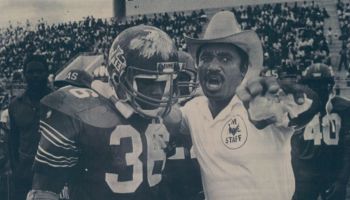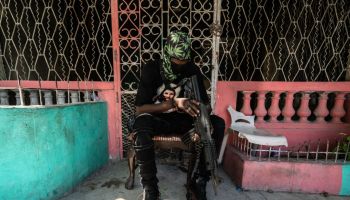Kitty Genovese was 28-years old when she was brutally stabbed to death and raped on a spring night in March of 1964.
Mere feet from her apartment in Kew Garden, Queens, New York , she exited her car and became aware of a strange man following her. Picking up her pace, she tried to quickly place distance between herself and her would-be attacker, Winston Moseley, but it was too late — he would not be deterred. He stabbed her again and again as she screamed for help. One neighbor — never leaving his apartment, nor calling 911 — opened his window and screamed for the man to leave her alone. He did, temporarily, and all was quiet again.
But he came back and stabbed her again as she begged for her life. Her blood curdling cries could be heard by surrounding neighbors as they peered out from the safety of their apartments. No one attempted to help. For some reason the man left — but quickly returned again to finish what he started. As Kitty lay semi-unconscious, he raped her and stole $49 from her wallet; then he ended her agony, leaving her in a spreading pool of blood.
Allegedly, an estimated 12 – 38 people either saw or heard fragments of this brutal attack, and did absolutely nothing.
As gruesome as that tale is, it is that same level of sick apathy that we are witnessing in the heart-wrenching tale of Glenda Moore. The 39-year-old Staten Island mother of two was desperately seeking refuge as Superstorm Sandy crashed into and pummeled New York City with flood waters and drenching rains. Her SUV stalled and she frantically unbuckled her sons, 2-year-old Brandon and 4-year-old Conner, from their car seats as the water furiously rose around them.
RELATED: 2 NYC Brothers Swept From Mother’s Arms During Storm Found Dead
Speaking with police, Moore recounted clinging to tree branches for hours, grasping at anything to protect her children as she searched for help through the torrential downpour. Finally managing to make it to the home of a neighbor, she knocked on the door, pleading for assistance. A man, Allen, allegedly peered through his door and refused to let her in. Determined to save her boys, she went around to the back of the house and attempted to throw a flower pot through the window, to no avail. Once again determined to brave the catastrophic storm, she clasped her young sons close to her and continued to search for shelter.
Then the unthinkable happened.
“She was holding onto them, and the waves just kept coming and crashing and they were under,” Moore’s sister told the New York Daily News. ““It went over their heads … She had them in her arms, and a wave came and swept them out of her arms.”
See CNN report below:
Screaming at the top of her lungs and shivering with cold, she begged for help with searching for her children and no one came to her aid.
“They answered the door and said, ‘I don’t know you. I’m not going to help you,’” continued Moore’s sister. “My sister’s like 5-foot-3, 130 pounds. She looks like a little girl. She’s going to come to you and you’re going to slam the door in her face and say, ‘I don’t know you, I can’t help you’?’”
Finally, suffering with hypothermia, an exhausted and distraught Moore flagged down police the next morning and the search for the boys began, lasting for several days as fragile hope flickered. It was finally extinguished when the bodies of little Conner and Brandon were found beneath branches, water and debris within yards from each, about a quarter mile from where they were torn from their mother’s arms.
RELATED: Hurricane Sandy Aftermath In Images
An angry nation turned its eyes to the neighbor and he returned its gaze unrepentant. Adamantly refuting the woman’s claim, he told police that a man beat on his door, then attempted to break into his house. According to the account he offered CNN’s Gary Tuchman, he sat with his back to the door the entire night in fear. But there was no man, just boys who had their manhood stolen from them by Mother Nature and the callous disregard of someone who just didn’t have it in his heart to open the door.
Why? Because, even if it were a woman and children at his door, he said, it was her fault that they’re dead.
“It’s unfortunate. She shouldn’t have been out though. You know, it’s one of those things,” he said. “I’m not a rescue worker … If I would have been outside, I would have been dead.”
Just as Kitty Genovese fought for her life in plain view of neighbors, Glenda Moore fought for hers, as well — both lost. The loving mother’s life was irrevocably shattered the minute she stepped out into that storm. Because just as in 1964, the Bystander Effect — that psychological flaw that allows some human beings to willfully ignore someone in obvious need of help due to diffusion of responsibility — played a pivotal role in her children’s death. It’s that little voice that says, “Why do I need to help; I’m sure someone else will.” Or, “All those people out there, I’m sure she’ll find help from someone; why me?”
Instead of “Why not me?” a man simply turned his back and two little boys are dead as a result.
He didn’t have to leave the comfort of his home. He didn’t have to lift a branch or build a bridge. He simply had to open his door to a woman and two small children in the middle of the most powerful storm ever to impact the Atlantic Coast — and he couldn’t even be bothered to do that.
On a dark spring morning in Queens in 1964, and a volatile night in Staten Island on Monday, occurred soul-numbing tragedies different in their scope but alarming in their common denominator: People refusing to simply help. Abraham Lincoln once said, “… if you want to test a man’s character, give him power.” The unapologetic Alan had power, as did ever single neighbor that sat in their houses ignoring the haunting calls of a mother searching for humanity, and, unfortunately, they revealed their characters.
We could play the “what if” game. What if she had evacuated earlier? What if the person in the first house had helped, or the next house had helped? But none of that matters, because when his time came to step up and help a mother and children in need, this man chose to step back. That’s not who we’re supposed to be as a country; that’s not who we should be as brothers and sisters in humanity. There is a basic level of decency present in all of us, and because he refused to tap into his –even if his sketchy claim that he thought he heard a man is to be believed — he shares the intangible weight of their blood on his hands.
Let this be a wake up call for all affected by the untimely deaths of little Connor and Brandon so that this tragedy will not be in vain. There may be a day when one of us are called to help in the midst of someone’s storm and all we may have to do is open our doors — and our hearts.
When that day comes, may we think of these two sweet boys, and have the strength of character not to turn our backs.
*Author’s note: The specifics of the Kitty Genovese case have been disputed in several circles, with some historians claiming that her lung injuries, caused by the piercing blade, made it impossible for her to scream. It has also been alleged that her neighbors were not apathetic bystanders, but simply unable to hear her muted cries for help. This is problematic for several reasons, primarily because it is reliant on the testimony of neighbors who would, like any other human being, not want to appear heartless and somehow responsible for Kitty’s death.
The legitimacy — or lack thereof — of the nuanced details, which are taught in Psychology courses in universities around the world, may be arguable; but the fact that they are the basis of an extensive, widely respected body of work surrounding the Bystander Effect/Genovese syndrome — subsequently, leading to a clearer understanding of the ugly side of humanity — is not.
*********************
Follow Kirsten West Savali on Twitter: @KWestSavali.
SEE ALSO:
Commander-In-Chief: Obama Calms The Storm In Sandy’s Wake
Hurricane Sandy Update: At least 90 Dead, 4.1 Million Without Power























